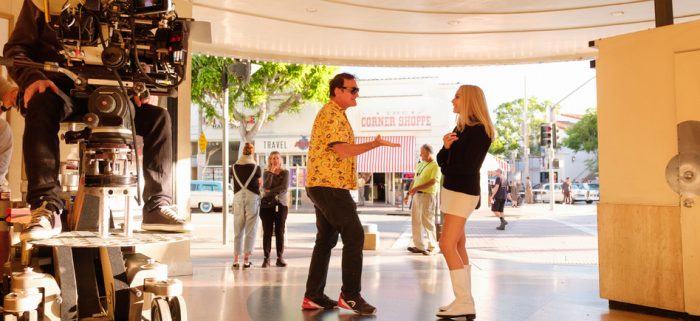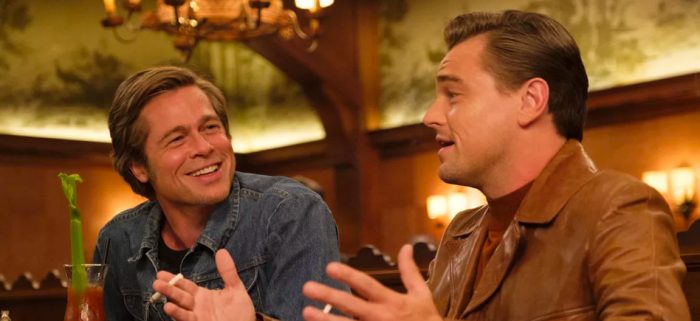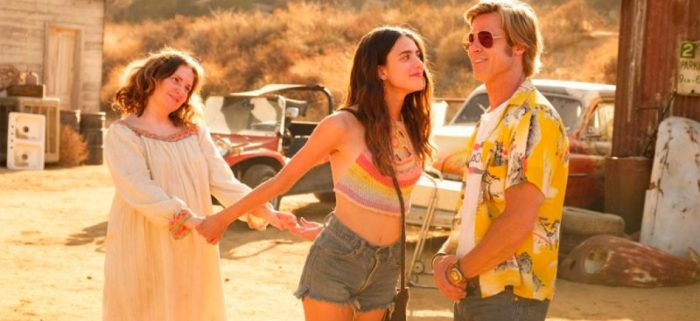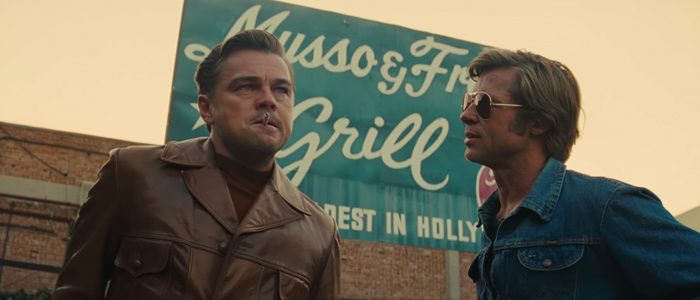'Once Upon A Time In Hollywood' Spoiler Review: Quentin Tarantino's Funny, Melancholy Masterwork
Who could've guessed that Once Upon a Time in Hollywood, once thought of as "Quentin Tarantino's Charles Manson movie", would end up being one of the sweetest films of the director's career? Beneath the rampant speculation, beneath the True Crime trappings, beneath the bursts of shockingly graphic violence, Once Upon a Time in Hollywood has a warm, loving heart.
It's a melancholy film – a film about endings, and beginnings. It's about living your dreams, and realizing that sometimes those dreams aren't enough – and then learning to accept that. You may be doing what you love, but you might still not be where you want to be. And maybe that's okay, as long as you have someone to share it all with. It's a fairytale. A question of "What if...?" writ large on celluloid. And it's a masterpiece.
The rest of this article contains major spoilers.
I Wished I Could Save Her in Some Sort of Time Machine
At some point, history turned Sharon Tate into a statistic. A footnote mentioned in conjunction with Charles Manson and his murderous "family." But Tate, whose brutal murder looms over the sunshine of Once Upon a Time in Hollywood like gathering storm clouds, was and is more than just a Manson Family victim. She was a flesh and blood person – someone who lived and loved and was loved in return. Someone who was cruelly cut down in the prime of her life, while pregnant with her first child. What happened to Sharon Tate on August 9, 1969, was an outrage. And the outrage only continued as time and history reduced her into little more than the stuff of True Crime books.
Once Upon a Time in Hollywood wants to right that wrong. Tarantino is looking at Tate's murder, and the murder of her friends who were unlucky enough to be in the house with her when the Manson Family came calling and saying "No." He's rewriting history, just as he did in Inglorious Basterds. He's saying, "Well, this didn't happen – but it should have happened."
Here, Tarantino is like Dale Cooper in David Lynch's Twin Peaks: The Return managing to bend time and space and rescue Palmer from her murder. Or like Neutral Milk Hotel frontman Jeff Mangum crafting In the Aeroplane Over the Sea around the fantastical idea of rescuing Anne Frank – "I wished I could save her in some sort of time machine," he sings on "Oh Comely." Like the doomed heroines of Twin Peaks and "Aeroplane Over the Sea", Once Upon a Time in Hollywood, and by extension writer-director Tarantino, views Tate's death as a cosmic wrong worth righting.
As a result, Tate is not just a character in Hollywood. She's also an ideal – an ethereal presence, the physical embodiment of the old school Hollywood cool Tarantino fetishizes unabashedly. "She's flesh and blood, but she's also an idea," he told Time Magazine.
With all this talk and focus on Tate, you might go into Tarantino's latest thinking she's a major part of the film. But she's not – at least not technically speaking. While Tate and her fate are a driving factor of the film, and the actress, played with warm, bubbly grace by Margot Robbie, is glimpsed several times throughout the course of the movie, she's only the focus of one scene. And what a scene it is.
Robert Richardson's camera follows Robbie as Tate as she goes about her day in Los Angeles. She picks up a hitch-hiker. She drives fast with the windows down, her golden hair billowing. She purchases a copy of Tess of the D'Urbervilles for her husband, Roman Polanski. And she goes to the movies. And not just any movie – her movie. While out and about she notices a theater showing The Wrecking Crew, the 1968 Matt Helm spy comedy starring Dean Martin. The price of a ticket is alarmingly low, and Sharon likely has more than enough money to buy her way into the theater. But she takes a risk, and asks: "What if you're in the movie?" The theater staff is amused and surprised, if not exactly star struck – they don't really know who she is until she mentions her part in Valley of the Dolls. But the gamble pays off, and Sharon is invited into the theater for free.
She dances her way to her seat as trailer music plays, and before long, she's watching herself on the silver screen. Except, Robbie is actually watching the real Sharon Tate. Tarantino could've re-shot Tate's scenes with Robbie, but he instead chose to keep them as-is. This could've backfired: Robbie looks like Tate, but she's not identical to the late actress. And showing the real deal and then immediately cutting to her modern-day stand-in has the potential to be jarring. But it works and lends an extra surreal, lovely quality to it all. Robbie is watching Tate, just as we are watching Robbie-as-Tate, and the past and the present are colliding before us in some sort of strange alchemy.
Tarantino gets a lot of criticism (some of it justified) for his brutality, but this one moment is so sweet, so tender, so charming, that it suggests that deep down, he's a bit of a softie. Sharon nervously listens to the audience whenever her character does something funny – and she's delighted to hear the crowd laughing along with her. Robbie's performance in this scene is perfection – the actress nails the excitement and the trepidation. We can practically feel the butterflies in her stomach. It's movie magic. As magical as a scene late in the film when one by one, we watch the neon signs of bars, fast food joints and of course, movie theaters, come flickering on – humming, buzzing, alive. Here, Sharon Tate lives again – even though she doesn't. She's flesh and blood, but she's also an idea.
More Than a Brother, and a Little Less Than a Wife
Sharon Tate and the Manson Family are fixtures in Once Upon a Time in Hollywood, but the people the film is most preoccupied with are washed-up actor Rick Dalton (Leonardo DiCaprio) and his longtime stuntman Cliff Booth (Brad Pitt). The two are close in ways only truly great friends can be, to the point where they're more or less a couple. They get together to drink and laugh and crack jokes while watching Rick's guest stint on FBI. They complement each other, both despite and because of their differences. Rick is needy, whiny even; terrified of being a failure. Cliff, meanwhile, is cool and carefree, and apparently good at everything. He's the one who projects the air of a movie star, while Rick seems like the type of person who should be hanging back.
But the opposite. While he's technically a stuntman, Cliff does very little stunt work. Instead, he primarily does odd jobs for Rick. He drives him around; he picks up stuff for him; he's there whenever he's needed, like a denim-clad butler. Like Rick, his career in showbiz is on the skids, and for a potentially good reason: word around town is that Cliff murdered his wife. Once Upon a Time in Hollywood gives us a quick flashback to this, and never states one way or another what happened. There's a chance the death was accidental. There's also a chance it wasn't. This moral ambiguity hangs over Cliff and colors him in darker tones. But Pitt is so likable; so cool; and yes, so god damn handsome, that it's very easy to fall under Cliff's sway. It certainly doesn't hurt that Cliff has a cute dog: a huge, lovable, scene-stealing pit bull named Brandy.
While Cliff zooms around LA in his car at dangerous speeds, taking breaks to effortlessly leap up onto rooftops like a damn ninja, Rick spirals down the drain. He's a star in the sense that people know his name, but he's not where he thought he'd be. At the start of the film, he meets with super-agent Marvin Schwarzs (Al Pacino, in a brief but wonderful part), who basically tells Rick that he's become nothing more than a punchline. Marvin thinks he has the solution: Rick should go to Italy and make spaghetti Westerns. But Rick would rather die. He doesn't want to be an Italian movie star. He wants to belong solely to Hollywood.
He's still booking parts. He's landing tons of guest roles on TV shows – usually as cowboys, since it was a cowboy TV show (Bounty Law) that made him famous. But to what end? He can learn his lines, but more often than not, he drinks himself into a stupor and blows them. While on the set of Lancer, he has something of an existential crisis. First, the director, Sam Wanamaker (Nicholas Hammond), buries Rick in make-up. "I hired you to be an actor, not a TV cowboy," he tells a befuddled Rick. Then, Rick breaks down crying while conversing with a far more professional co-star...who is also a child (played to perfection by young actress actor Julia Butters).
Tarantino goes all-in on this sequence, recreating entire scenes of Lancer and putting us in the director's chair, so to speak. We get to watch Rick work...and fail. And berate himself. And retreat to his trailer where he has a complete meltdown. But then, something miraculous: he gets his shit together. He goes back to set and knocks a scene out of the park. "That was the greatest acting I've ever seen," his young co-star tells him, and he breaks down in gratitude. This entire moment could've been completely played for laughs – and indeed, it's quite funny. DiCaprio earns a lot of laughs from his work in the film – he's more of the comic relief than the leading man. But DiCaprio also takes things a step further. He brings a wounded innocence to Rick, enabling us to empathize with him. And when his co-star pays him a compliment, we're happy for him.
It becomes apparent in these long stretches where Rick and Cliff sit around and shoot the shit that Tarantino loves these characters, perhaps more than he's loved any of his characters in the past. Once Upon a Time in Hollywood is short on plot – and that's perfectly fine. In fact, it's by design. "I had a situation where I thought, We don't need a story," he said. "They're the story. Let's just have a day in the life of these characters."
We follow Rick and Cliff through Hollywood and beyond, and we grow accustomed to them, just as they've long grown accustomed to each other. The friendship between these two is what drives Hollywood, and DiCaprio and Pitt are absolutely electric together. We grow so enamored with them that when the film grinds to a stop and announces that they're about to part ways, we're heartbroken.
Rick has gotten married, and can no longer afford to pay Cliff. As a result, they're breaking up the way a long-married couple might – with sadness, with regret, but also with a wistfulness reflecting on the past, and thinking about the future. They plan to get blind drunk together one last time at Rick's place – which is right next door to the house occupied by Sharon Tate. And wouldn't you know it? The big night of the breakup just happens to be August 9, 1969.
Charlie's Gonna Dig You
The name "Manson" is never uttered in Once Upon a Time in Hollywood, but Charles Manson and his followers have their part to play. Manson himself only pops-up in one quick scene, played with just the right amount of grinning menace by Damon Herriman. Then he's gone – a ghost, a shadow, someone who escapes from the picture. How does Manson's story play out in this universe? What becomes of him? The film doesn't answer that, and it ultimately doesn't care. Like Tate, Manson is more of a presence than a person. A boogeyman. A vampire that Tarantino wants to defang.
Manson and his hippie cultists have taken on near-supernatural qualities thanks to decades of media portrayals. Once Upon a Time in Hollywood revels in making them human again – and showing how despicable they are in the process. Just as Tarantino loves Rick, Cliff and Sharon Tate, you can tell he hates Manson's followers. And he channels that hatred by letting Cliff beat the hell out of them, and mock them to their faces.
The build-up is exquisite. On two occasions, Cliff spots an alluring hippie girl hitching a ride. The third time he sees her, he picks her up. Her name is Pussycat (or so she claims), and it's not long into the ride before she's literally throwing herself at Cliff. Does Cliff want her? It's unclear. He's obviously turned on by her, but he also suspects something is...off. Especially when she mentions that she and her friends live out at the Spahn Movie Ranch, where Cliff used to work as a stuntman.
Margaret Qualley plays Pussycat and promptly turns herself into a movie star in the process. She's manic, she's captivating, she's authentic. It's a stellar performance, especially when you step back and realize how brief it ultimately is.
Tarantino goes into full-blown horror movie territory at the Spahn Movie Ranch, lingering on dusty streets, rats caught in glue traps, insects swarming. It becomes clear immediately that all is not well here, and the people who inhabit the ranch – mostly barefoot hippie girls, but a few skeevy guys as well – aren't on the level. Cliff worries they're exploiting the ranch's owner, an old, blind man named George Spahn (Bruce Dern). To an extent, they are, although not the way Cliff originally imagined.
The scene between Dern and Pitt is like a pressure valve being turned at the last minute. Tarantino appears to be building to some horrific reveal as Cliff stalks through a spooky house, only to end up with a blind, senile old man in bed. Here, again, Tarantino is highlighting the past. Dern's George Spahn is the living embodiment of the old Hollywood that's slowly being eroded away. A blind, clueless coot who would rather just nap – exploited by young, scheming nobodies in thrall to a madman.
Three members of the Manson Family return at the end, and here is where Once Upon a Time in Hollywood shows all its cards. Up until the climax, there's no indication that Tarantino is taking an alternate history route. As a result, dread blankets the film when a title card reveals it's August 9. As Cliff and Rick get drunk, we also follow Sharon and her friends around town. The tension builds – we think we know what's coming. Before the night is out, the very pregnant Sharon Tate and all her companions will be brutally slaughtered.
At least, that's what happened in our universe. But our universe didn't have Rick Dalton and Cliff Booth. Once Upon a Time in Hollywood throws a wrench into the Manson Family plans with...margaritas. As Cliff, smoking an acid-laced cigarette, takes Brandy for a stroll in Rick and Sharon's neighborhood, Rick stays home and makes some margaritas. And as he's in the midst of whipping them up, he happens to notice the junker car carrying the four members of the Manson Family who have come here tonight to kill the inhabitants of Sharon Tate's home.
A drunken confrontation between Rick and the would-be-killers changes the plan. They're no longer going to go to Sharon's house – they're going to go to Rick's. Here, again, Tarantino strips away the mythology of the Manson Family. When Charles "Tex" Watson (Austin Butler) bursts into Rick's home, he's immediately confronted with the sight of a stoned Cliff. Cliff vaguely remembers him from his trip to the ranch and asks his name. "I'm the devil, and I'm here to do the devil's business," Tex says – as the real Tex Watson said during the Tate murders. It's meant to be a scary, devastating line – Rob Zombie even ended up putting it in the mouth of one of his killers in The Devil's Rejects. But Cliff immediately deflates the moment: "Nah, it was something stupider. Rex or something."
Pitt's work during this moment is among the best of his career. Hilarious and in full-blown jerk mode, Pitt plays Cliff not as a cool action hero, but more of a jerk who can't keep his mouth shut. And this jerk happens to have a giant pitbull at his disposal. What follows is an orgy of violence, as first Brandy, and then Cliff brutally stops the home invaders. Cliff isn't just killing the Manson Family members – he's obliterating them. As if Tarantino is taking the rage of the injustice done to Tate and company out on these poor saps as their bodies are ripped, bit, torn, smashed and ultimately burnt to a crisp.
You're a Good Friend
The stark brutality of the death scene(s) leads to two of the sweetest moments in the film and Tarantino's entire career. First, as the injured Cliff is being hauled away to the hospital, he and Rick share one last moment of banter before Rick drops all pretense, and tells him: "You're a good friend, Cliff." Cliff salutes him, smiling: "I try." It's simple – in fact, it's one of the more simple dialogue exchanges in Tarantino's otherwise verbose career. But it says so much. These two men need each other – and love each other. Rick needs Cliff more than Cliff might need Rick – but Cliff would never dream of leaving Rick on his own. He needs to please his buddy. "I try."
The second sweet scene is the final one, where Once Upon a Time in Hollywood underlines the fact that Sharon Tate and her housemates are alive and well. Jay Sebring (Emile Hirsch), who died along with Tate, is the first to appear – asking Rick just what happened tonight. Rick tells him, and Jay is understandably shocked. He has no idea that he just dodged a bullet. That in some other universe – like the nightmare one we're currently in – he was brutally murdered while trying to protect Sharon.
Jay happens to mention that Sharon Tate knows who Rick is – and that she thinks of him as a movie star. Rick is flattered, just as he was when his young co-star complimented him. And when Rick is happy, we're once again happy for him. He may not be the biggest star in the world, but he's by no means a nobody. And he gets an invite up to Sharon's house, where he's warmly embraced by the pregnant actress and her friends, like a family member coming home for Thanksgiving. Tarantino hangs back – the camera floats above, a God's-eye view looking down at a world we can only glimpse, but not inhabit. A world where Sharon Tate lives on. What comes next for her? Does she have her baby? Does her career flourish, and her star power grow? The possibilities are endless for this Sharon Tate. It's a fairytale. A bedtime story. A happy ending where one previously did not exist.
And somewhere, sometime, maybe it happened. Once upon a time in Hollywood.




